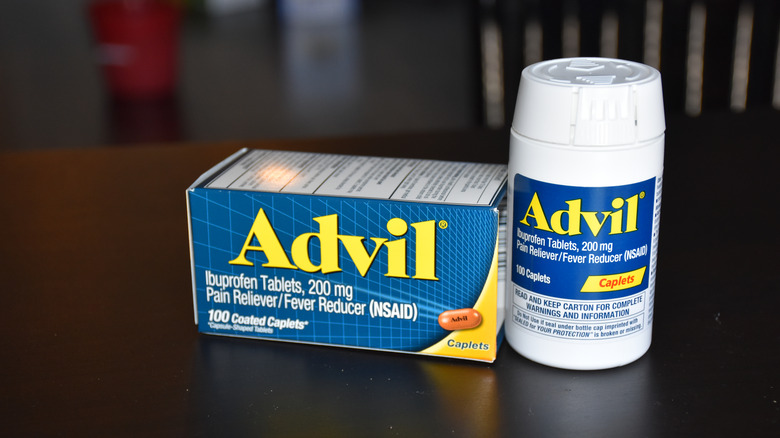The Real Difference Between Aspirin And Ibuprofen
When you're in pain you may open your medicine cabinet and wonder what the best option is for treating it. Is aspirin or ibuprofen the right choice? Luckily, both treatments have great pain-relieving properties, although there are some key differences.
Aspirin and ibuprofen are both nonsteroidal anti-inflammatory drugs, commonly called NSAIDs, and are used to treat pain, swelling, and fever. Ibuprofen is the active ingredient in brand-name products like Advil and Motrin, while aspirin is contained in products like Bayer and Excedrin (via Cleveland Clinic). The difference comes down to the chemical makeup of the basic ingredient — with ibuprofen derived from propionic acid and aspirin made from salicylic acid (via Insider). Although they're different on a molecular level, they function the same way: by fighting the enzyme cyclooxygenase. This keeps prostaglandins from developing, which can cause inflammation and pain.
Both pain relievers are commonly used to treat pain from injury, illness, fever, cramps, headaches, and arthritis. A low dose of aspirin (81 milligrams) is also sometimes prescribed to fight against heart attack, stroke, or blood clots. Ibuprofen does not have the same blood-thinning effect and is not used for this purpose (via Drugs.com).
Side effects to note
There are some side effects of NSAIDs that need to be kept in mind. Aspirin and ibuprofen can both cause stomach upset or heartburn, particularly when taken on an empty stomach (via Insider). And if you take low-dose aspirin for its anti-clotting effects, you should not take ibuprofen without talking to your doctor first. This is because ibuprofen can interfere with aspirin, leaving you less protected from heart attacks or strokes (via Verywell Health).
High doses of ibuprofen — greater than 1,200 milligrams per day — seem to be associated with an increased risk of cardiovascular problems. People with a history of heart problems should speak with their doctor if they find themselves needing to use ibuprofen continually. Both aspirin and ibuprofen can lead to kidney problems if taken in high dosages. Use no more than the recommended dosage at no greater than the recommended interval (typically every four to six hours). Additionally, both aspirin and ibuprofen should be avoided during pregnancy. Doctors typically recommend expectant mothers to take Tylenol (acetaminophen) when needing pain relief.


